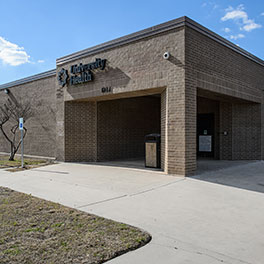If you’re worried that your child has a developmental delay, learning challenges or behavioral problems, we can help. Consult with your child’s pediatrician to get a referral to a developmental-behavioral pediatrician, who specializes in these issues.
What Is a Developmental-Behavioral Pediatrician?
Developmental-behavioral pediatricians have advanced training and experience to care for children and adolescents who need specialized medical, psychological and social care.
These medical doctors complete:
- Four years of medical school
- Three years of residency training in pediatrics
- Board certification in pediatrics
- Three years of fellowship training in developmental-behavioral pediatrics
- Board certification in developmental-behavioral pediatrics
All of this advanced training ensures that your child will get care from knowledgeable, experienced experts. Our developmental-behavioral pediatricians have a deep understanding of their field. We will get to the source of your child’s issue and find a solution.
The Role of Developmental-Behavioral Pediatricians
The main role of developmental-behavioral pediatricians is to evaluate kids who aren’t developing, learning or behaving the way their peers are.
Developmental-behavioral pediatricians help parents and caregivers understand their child’s issue and its effects on the family. They also teach parents and caregivers to advocate for their child.
The goal is to ensure that the child receives all supports and services they need. This includes therapy, school services and support from community agencies.
Developmental-Behavioral Conditions We May Help Manage
Your child’s primary care provider may consult a developmental-behavioral pediatrician to evaluate for:
- Autism spectrum disorder (ASD)
- Behavioral problems that are severe and interfere with daily function (e.g., a child dismissed from daycare because of aggression toward classmates)
- Attention-deficit/hyperactivity disorder (ADHD) that has not improved despite maximal dosing of the appropriate medication
- Chronic constipation
- Developmental delays that don’t improve after six months of therapy
- Diagnostic confusion (e.g., bipolar, ASD, ODD and OCD in same patient)
- Pediatric feeding disorder. PFD is difficulty eating or refusing to eat an age-appropriate diet or not eating enough to gain weight and grow
- Genetic and chromosomal disorders
- Trisomy 21 (Down syndrome) not developing as expected for that condition
- Global developmental delay – Showing delays in several areas of development
- Intellectual disability – Limited mental, social, conceptual and practical abilities
- Parent-child conflict (sometimes called “oppositional-defiant disorder”)
- Weight faltering (sometimes called “failure to thrive”) – Weight-to-length ratio or body mass index below the fifth percentile, rather than simply “low weight”
- Sleep disorder or severely disrupted sleep that does not improve with treatment
- Under-controlled, impulsive or aggressive behaviors that interfere with daily life
- Anxiety disorders such as selective mutism
Why Would a Developmental-Behavioral Pediatrician Not See My Child?
Our developmental-behavioral pediatricians are unable to evaluate for any of the following:
- Isolated language or motor delay responding well to therapy. These children are progressing and do not need further evaluation.
- Initial ADHD evaluation or management for children aged 4 and older. Per the American Academy of Pediatrics, this is the primary care provider’s responsibility.
- Learning disability (e.g., dyslexia). If your child age 7 or older and has difficulty learning one subject, please request in writing formal testing by the local public school district.
- Uncomplicated trisomy 21 (Down syndrome). Per the American Academy of Pediatrics, this is the primary care provider’s responsibility.
- Uncomplicated preterm infants and NICU graduates. The University Health PREMIEre clinic manages these patients.
The Evaluation Process: What to Expect
Most patients who see a University Health developmental-behavioral pediatrician undergo a seven-step evaluation. Most evaluations involve behavioral questionnaires that caretakers and the child’s daycare providers or teachers must complete and return.
If your child has undergone any previous evaluations (e.g., audiology, speech, child neurology or school testing), the developmental-behavioral pediatrician will need copies of those documents. This helps the doctor see the “big picture.”
- Intake (60 minutes): The doctor will interview you to get a detailed medical history of your child and perform a medical examination.
- Sleep (30 minutes): The doctor will ask you about your child’s sleep habits.
- Feeding & Elimination (30 minutes): The doctor will ask how your child eats and about their bowel movements.
- Developmental Testing (60 minutes): The doctor will administer standardized testing of development or intelligence to determine your child’s strengths and weaknesses.
- Behavioral Testing (60 minutes): If there is concern about autism spectrum disorder, the doctor will administer the Autism Diagnostic Observation Schedule®, Second Edition. The ADOS®-2 is a semi-structured, standardized assessment of communication, social interaction, play and restricted and repetitive behaviors.
- Feedback (30 minutes): The doctor will meet with all caretakers to explain your child’s diagnoses and to discuss recommendations for treatment. The doctor will provide a written report to you and the primary care provider.
- Review (30 minutes): The doctor will review everything with you and ask if you have followed the recommendations.
Developmental-Behavioral Management
Rely on your developmental-behavioral pediatrician to create the best care plan for your child and family. This may include:
- Applied behavior analysis therapy, feeding therapy, occupational therapy, orientation and mobility (i.e., vision) therapy, physical therapy or speech therapy
- Guidance and counseling for you to better manage your child’s behavior
- Consulting other pediatric subspecialists (e.g., child neurology, pediatric gastroenterology)
- Special education services in public school
- Medications to target specific symptoms
What Can I Do before My Child Sees the Developmental-Behavioral Pediatrician?
If your child is 0 to 35 months old: You or your primary care provider can contact Early Childhood Intervention (ECI). ECI evaluates infants and toddlers to see if they need therapy. ECI will provide therapy in your home or at daycare for free.
- Visit ECI Program Search (state.tx.us)
- Call 1-877-787-8999
If your child is age 36 months to 6 years: You can contact the elementary school nearest your home. Ask them in writing to evaluate your child for Early Childhood Special Education eligibility.
If there is concern about autism spectrum disorder, your child’s primary care provider must refer for both of the following:
- Audiology: To evaluate for hearing loss
- Speech and language evaluation: To evaluate for language delay
Community Resources in San Antonio
For children with autism spectrum disorder, consider:
- Registering with Autism Lifeline Links
- Contacting Any Baby Can of San Antonio
For adolescents and young adults with developmental delays:
- Refer to The Arc of San Antonio for support
Please complete and submit this form along with your referral in order to schedule an appointment.


